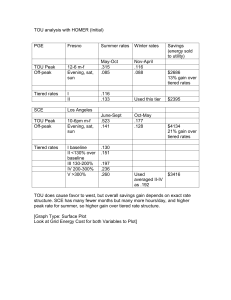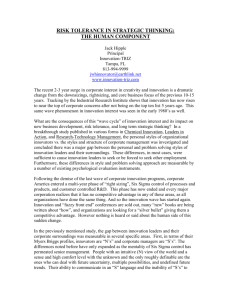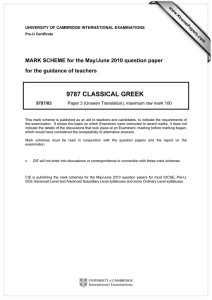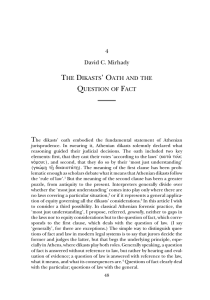1 Clauses out of Context:
advertisement
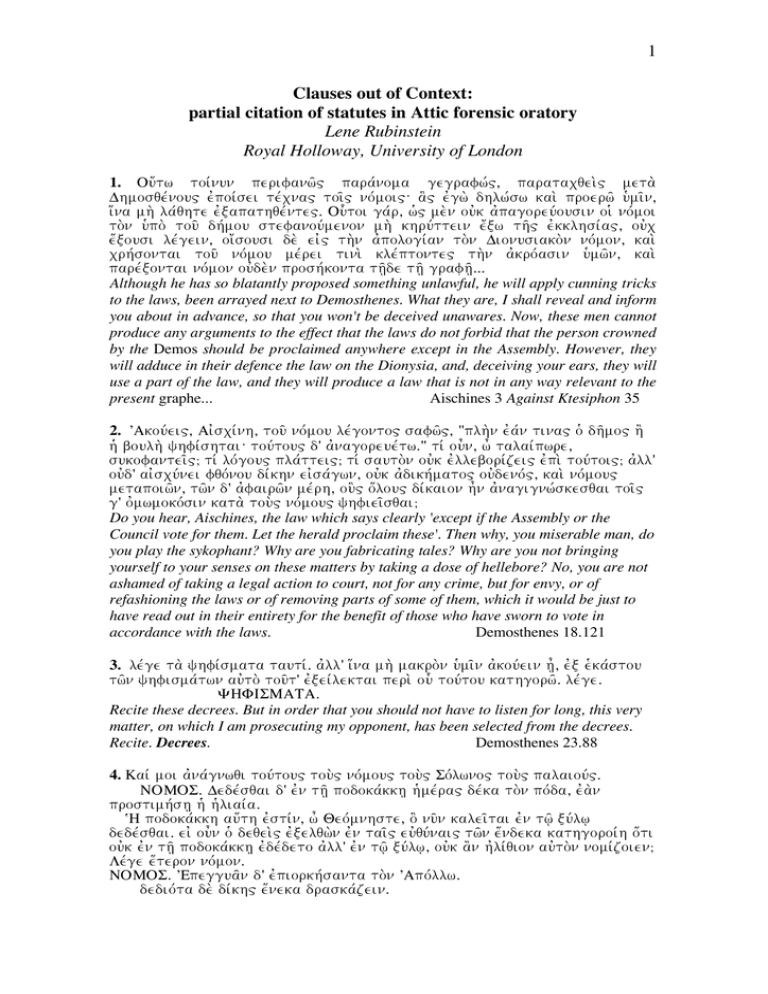
1
Clauses out of Context:
partial citation of statutes in Attic forensic oratory
Lene Rubinstein
Royal Holloway, University of London
1. Ou{tw toivnun perifanw'" paravnoma gegrafwv", paratacqei;" meta;
Dhmosqevnou" ejpoivsei tevcna" toi'" novmoi": a}" ejgw; dhlwvsw kai; proerw' uJmi'n,
i{na mh; lavqhte ejxapathqevnte". Ou|toi gavr, wJ" me;n oujk ajpagoreuvousin oiJ novmoi
to;n uJpo; tou' dhvmou stefanouvmenon mh; khruvttein e[xw th'" ejkklhsiva", oujc
e{xousi levgein, oi[sousi de; eij" th;n ajpologivan to;n Dionusiako;n novmon, kai;
crhvsontai tou' novmou mevrei tini; klevptonte" th;n ajkrovasin uJmw'n, kai;
parevxontai novmon oujde;n proshvkonta th'/de th'/ grafh'/...
Although he has so blatantly proposed something unlawful, he will apply cunning tricks
to the laws, been arrayed next to Demosthenes. What they are, I shall reveal and inform
you about in advance, so that you won't be deceived unawares. Now, these men cannot
produce any arguments to the effect that the laws do not forbid that the person crowned
by the Demos should be proclaimed anywhere except in the Assembly. However, they
will adduce in their defence the law on the Dionysia, and, deceiving your ears, they will
use a part of the law, and they will produce a law that is not in any way relevant to the
present graphe...
Aischines 3 Against Ktesiphon 35
2. ∆Akouvei", Aijscivnh, tou' novmou levgonto" safw'", Æplh;n ejavn tina" oJ dh'mo" h]
hJ boulh; yhfivshtai: touvtou" dæ ajnagoreuevtw.Æ tiv ou\n, w\ talaivpwre,
sukofantei'"… tiv lovgou" plavttei"… tiv sauto;n oujk ejlleborivzei" ejpi; touvtoi"… ajllæ
oujdæ aijscuvnei fqovnou divkhn eijsavgwn, oujk ajdikhvmato" oujdenov", kai; novmou"
metapoiw'n, tw'n dæ ajfairw'n mevr h, ou}" o{lou" divkaion h\n ajnagignwvskesqai toi'"
gæ ojmwmokovsin kata; tou;" novmou" yhfiei'sqai…
Do you hear, Aischines, the law which says clearly 'except if the Assembly or the
Council vote for them. Let the herald proclaim these'. Then why, you miserable man, do
you play the sykophant? Why are you fabricating tales? Why are you not bringing
yourself to your senses on these matters by taking a dose of hellebore? No, you are not
ashamed of taking a legal action to court, not for any crime, but for envy, or of
refashioning the laws or of removing parts of some of them, which it would be just to
have read out in their entirety for the benefit of those who have sworn to vote in
accordance with the laws.
Demosthenes 18.121
3. levge ta; yhfivsmata tautiv. ajllæ i{na mh; makro;n uJmi'n ajkouvein h\/, ejx eJkavstou
tw'n yhfismavtwn aujto; tou'tæ ejxeivlektai peri; ou| touvtou kathgorw'. levge.
YHFISMATA.
Recite these decrees. But in order that you should not have to listen for long, this very
matter, on which I am prosecuting my opponent, has been selected from the decrees.
Recite. Decrees.
Demosthenes 23.88
4. Kaiv moi ajnavgnwqi touvtou" tou;" novmou" tou;" Sovlwno" tou;" palaiouv".
NOMOS. Dedevsqai dæ ejn th'/ podokavkkh/ hJmevra" devka to;n povda, eja;n
prostimhvs h/ hJ hJliaiva.
ÔH podokavkkh au{th ejstivn, w\ Qeovmnhste, o} nu'n kalei'tai ejn tw'/ xuvlw/
dedevsqai. eij ou\n oJ deqei;" ejxelqw;n ejn tai'" eujquvnai" tw'n e{ndeka kathgoroivh o{ti
oujk ejn th'/ podokavkkh/ ejdevdeto ajllæ ejn tw'/ xuvlw/, oujk a]n hjlivqion aujto;n nomivzoien…
Levge e{teron novmon.
NOMOS. ∆Epeggua'n dæ ejpiorkhvsanta to;n ∆Apovllw.
dediovta de; divkh" e{neka draskavzein.
2
Tou'to to; ejpiorkhvsanta ojmovsantav ejsti, tov te draskavzein, o} nu'n
ajpodidravskein ojnomavzomen.
Please read for me those ancient laws of Solon.
Law: ...Let him be confined by his foot for ten days in the podokakke, if the Heliaia
shall impose this penalty... This 'podokakke', Theomnestos, is what is now called 'being
confined in the stocks'. If someone who had been confined were after his release to
accuse the Eleven at their euthynai on the grounds that they had confined him not in the
podokakke but in the stocks, they would presumably regard him as an idiot. Please
read another law.
Law: '...After swearing an oath by Apollo, let him give security. If he is afraid on
account of justice, let him abscond...' This word 'epiorkesanta' means 'swearing', and
'draskanein' is what we call 'to run away'.
Lysias 10.16-17 (trs. Todd)
5. Labe; dh; aujtoi'" tou;" novmou", paræ ou}" tau'ta pepoihvkasi, kai; ajnavgnwqi.
Novmo"
∆Entau'qa me;n oJmoivw" kai; ajdelfh; kai; ajdelfidou'" ijsovmoiroi kata; to;n novmon
eijsivn. Labe; dh; kai; tou'ton kai; ajnagivgnwske aujtoi'".
Novmo"
∆Ea;n mh; w\sin ajneyioi; mhde; ajneyiw'n pai'de" mhde; tou' pro;" patro;" gevnou" h\/
proshvkwn mhdeiv", tovte ajpevdwke toi'" pro;" mhtrov", diorivsa" ou}" dei' kratei'n.
Now take the laws, in contravention of which my opponents did this, and read them out
to them.
Law
Here, on the one hand, a sister and the off-spring [of a sister] alike are entitled to equal
shares according to the law. Now take this one, too, and read it out to them.
Law
If there are no cousins or children of cousins, nor any relative on the father's side, then
it has given (the inheritance) to the relatives on the mother's side, having defined who is
to take precedence.
Isaios 7.21-22
6. ajlla; mh;n ÆgnhsivwnÆ gæ o{tan levgh/ kai; Ækurivw" kata; to;n qesmovnÆ,
parakrouvetai para; tou;" novmou". to; me;n ga;r gnhvsiovn ejstin, o{tan h\/ govnw/
gegonov": kai; oJ novmo" tau'ta marturei' levgwn, Æh}n a]n ejgguhvsh/ path;r h]
ajdelfo;" h] pavppo", ejk tauvth" ei\nai pai'da" gnhsivou".Æ to; de; Ækurivw"Æ kata;
tw'n poihvsewn oJ nomoqevth" e[laben, uJpolambavnwn dei'n, o{tan ti" w]n a[pai" kai;
kuvrio" tw'n eJautou' poihvshtai uiJovn, tau'ta kuvria ei\nai.
But surely when he say 'legitimate children; and adds 'validly according to the
ordinance', he is misleading you in defiance of the laws. For 'legitimate' [gnesion]
means when a child is born of one's body, and the law attests this usage when it says
'legitimate children are born from a woman whom a father or brother or grandfather
has pledged in marriage'. And as for 'validly', the lawgiver used this word in reference
to adoptions, understanding that whenever a man who is childless and has control of
his own property adopts a son, this ought to be 'valid'. [Dem.] 44.49 (trs. Scafuro)
3
7. ãNovmoià Dia; tau'qæ uJmi'n ajnevgnwn tou;" novmou", o{ti kata; to;n prw'ton aujtw'n
ijscurivzetai tw'/ paidi; tou' hJmiklhrivou proshvkein, oujk ajlhqh' levgwn. Ouj ga;r h\n
hJmi'n ÔAgniva" ajdelfov", oJ de; novmo" peri; ajdelfou' crhmavtwn prw'ton ajdelfoi'"
te kai; ajdelfidoi'" pepoivhke th;n klhronomivan, eja;n w\sin oJmopavtore":
Laws. I've read you the laws for this reason, because according to the first of these, my
opponent maintains that the boy is entitled to half the estate, a claim that is not true.
Hagnias was not our brother, but the law concerning a brother's property has given the
right of inheritance first to brothers and nephews, if they are on the father's side: this is
the nearest degree of relationship to the deceased.
Isaios 11.1 (trs. Edwards)
8. Eij dev toi mhde;n touvtwn e{xei eijpei'n, pw'" oujk ejlegcqhvsetai fanerw'" ejme; me;n
sukofantw'n, uJma'" dæ ejxapath'sai para; tou;" novmou" zhtw'n… ∆Anabibasavmeno"
ou\n aujto;n ejnantivon uJmw'n ejrwthvsw ta; ejn toi'" novmoi" uJpanagignwvskwn: ou{tw"
ga;r ei[sesqe eij proshvkei tw'/ paidi; tw'n ÔAgnivou crhmavtwn h] mhv. Labe; ou\n
aujtoi'" tou;" novmou": su; dæ ajnavbhqi deu'ro, ejpeidh; deino;" ei\ diabavllein kai; tou;"
novmou" diastrevfein. Su; dæ ajnagivgnwske.
Novmoi
But if he cannot state any of these, surely he will be clearly proved to be acting as a
sykophant against me and trying to deceive you in contravention of the laws. I shall
therefore bring him up before you and question him, reading the law clause by clause,
and in this way you will learn whether the boy is entitled to the property of Hagnias or
not. Please take the laws; and you, come up here, since you are so clever at slandering
and twisting the laws. You read.
Isaios 11.4 (trs. Edwards)
cf. e.g. Dem. 37.45-47 + 37.33 with Thür (2008: 63-64).
9. Kai; pw'" levgei… a[n ti" ∆Aqhnaivwn, fhsivn, eJtairhvsh/, mh; ejxevstw aujtw'/ tw'n
ejnneva ajrcovntwn genevsqai, o{ti oi\mai stefanhfovro" hJ ajrchv, mhdæ iJerwsuvnhn
iJeravsasqai, wJ" oujde; kaqarw'/ tw'/ swvmati, mhde; sundikhsavtw, fhsiv, tw'/ dhmosivw/,
mhde; ajrxavtw ajrch;n mhdemivan mhdevpote, mhvtæ e[ndhmon mhvte uJperovrion, mhvte
klhrwth;n mhvte ceirotonhthvn: mhde; khrukeusavtw, mhde; presbeusavtw, mhde;
tou;" presbeuvsanta" krinevtw, mhde; sukofanteivtw misqwqeiv", mhde; gnwvmhn
eijpavtw mhdevpote mhvte ejn th'/ boulh'/ mhvte ejn tw'/ dhvmw/, mhdæ a]n deinovtato" h\/
levgein. ∆Ea;n dev ti" para; tau'ta pravtth/, grafa;" eJtairhvsew" pepoivhke kai; ta;
mevgista ejpitivmia ejpevqhken. Levge aujtoi'" kai; tou'ton to;n novmon, i{næ eijdh'te oi{wn
novmwn uJmi'n keimevnwn, wJ" kalw'n kai; swfrovnwn, tetovlmhke Tivmarco"
dhmhgorei'n oJ toiou'to" to;n trovpon oi|on uJmei'" ejpivstasqe.
And what does he say? If any Athenian (he says) prostitutes himself, he is not to have
the right to serve as one of the nine archons (the reason being, I think, that these
officials wear a sacred wreath), nor to undertake and priesthood, since his body is quite
unclean; and let him not serve (he says) as advocate for the state or hold any office
ever, whether at home or abroad, whether selected by lot or elected by a vote; let him
not serve as herald, nor as envoy (nor let him bring to trial people that have served as
envoys, nor let him act as sykophant for pay), nor let him voice any opinion in the
Council or the Assembly (not even if he is the cleverest speaker in Athens). If anyone
acts against these provisions, he has allowed for indictments (graphai)for prostitution
and imposed the most severe penalties. Read this law out to them as well, to make you
aware of the noble and decent character of the established laws, against which
Timarchos has dared to address the Assembly, a man whose way of life is known to you
all.
Aischines 1.19-20 (trs Carey)
4
10. ∆Ea;n dæ ejpiceirw'si levgein wJ" oujc hJtaivrhken o{sti" mh; kata; suggrafa;"
ejmisqwvqh, kai; grammatei'on kai; mavrtura" ajxiw'siv me touvtwn parascevsqai,
prw'ton me;n tou;" peri; th'" eJtairhvsew" novmou" mevmnhsqe, ejn oi|" oujdamou'
mneivan oJ nomoqevth" peri; sunqhkw'n pepoivhtai. Ouj gavr, eij kata; grammatei'ovn
ti" eJauto;n kathv/scune, tou'tæ ejxhvtasen, ajlla; pantelw'", o{pw" a]n hJ pra'xi"
gevnhtai, to;n pravxanta keleuvei mh; metevcein tw'n th'" povlew" koinw'n. Eijkovtw":
o{sti" ga;r nevo" w]n ajpevsth diæ aijscra;" hJdona;" th'" eij" ta; kala; filotimiva",
tou'ton oujk wj/ hvqh dei'n presbuvteron genovmenon ejpivtimon ei\nai.
If they try to argue that a man has not prostituted himself if he did not make a contract
to hire himself out, and demand that I provide documentation and witnesses to this
effect, firstly remember the laws concerning prostitution; nowhere does the legislator
mention contracts. He did not ask whether anyone had disgraced himself under a
written contract, but, however the activity takes place, he absolutely bars the man who
has engaged in it from the public affairs of the city. And rightly so. If any man in his
youth abandoned noble ambitions for the sake of shameful pleasure, he believed that
this man should not in later years enjoy political rights. Aischines 1.160 (trs. Carey)
11. Kai; tivna e{teron novmon e[qhke fuvlaka tw'n hJmetevrwn paivdwn… to;n th'"
proagwgeiva", ta; mevgista ejpitivmia ejpigravya", ejavn ti" ejleuvqeron pai'da h]
gunai'ka proagwgeuvh/. This law is not read out; the speaker proceeds straight to
another law concerning hybris.
What other law did he lay down to protect your children? The law against procuring, to
which he attached the most severe penalties, if anyone procures for prostitution a free
boy or a woman.
Aischines 1.14 (trs. Carey)
12. Kai; ta;" proagwgou;" kai; tou;" proagwgou;" gravfesqai keleuvei, ka]n aJlw'si,
qanavtw/ zhmiou'n, o{ti tw'n ejxamartavnein ejpiqumouvntwn ojknouvntwn kai;
aijscunomevnwn ajllhvloi" ejntugcavnein, aujtoi; th;n auJtw'n ajnaivdeian
parascovnte" ejpi; misqw'/ to; pra'gma eij" diavpeiran kai; lovgon katevsthsan.
And he allows for indictment (graphe) of procurers, male and female; and if they are
convicted, he makes death the punishment. The reason is that when people who wish to
sin hesitate through shame to come together, the procurers offer their own lack of
shame for pay and advance the affair to the point of discussion and action.
Aischines 1.184 (trs. Carey)
Carey, C. (2000) Aeschines, Austin, Texas.
Edwards, M. (2007) Isaeus, Austin, Texas.
Edwards, M. (2008) 'Isaeus and the Athenian Inheritance Laws' in Harris, E. M. and G.
Thür [eds] Symposion 2007. Vienna, 41-54.
Kästle, D. (2012) 'Novmo" megivsth bohvqeiaL: Zur Gesetzesargumentation in der
attischen Gerichtsrede' in Zeitschrift der Savigny-Stiftung für Rechtsgeschichte 129,
161-205.
Scafuro, A. C. (2011) Demosthenes, Speeches 39-49, Austin, Texas.
Thür, G. (2008) 'The Principle of Fairness in Athenian Legal Procedure: Thoughts on
the Echinos and Enklema' in Dike 11, 51-73.
Todd, S. C. (2007) A Commentary on Lysias Speeches 1-11. Oxford.
Wankel, H. (1976) Demosthenes. Rede für Ktesiphon über den Kranz. Heidelberg.

